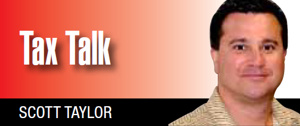It's now been 15 years since Don Wilkinson, a truck driver from Winnipeg, won his meal-expense case in tax court. You don't remember Don Wilkinson? Well, you should, every time you order food at a truck stop.
On his 1997 tax return, Wilkinson claimed meal expenses using a “simplified” federal flat-rate calculation of $40 a day instead of the customary $33 a day at the time. He got audited, penalized, and went to court arguing that
$33 didn't reflect the real cost of three square meals on the road.
In August 2000, a judge agreed. The ruling didn't establish what was “reasonable” for a truck driver to claim, it only meant that in Wilkinson's case, $33 was not.
The decision opened the door for drivers to challenge the per diem amount on their tax returns and for the CRA to revise its standards on meal deductions, including raising the rate to $17 a meal.
It also got owner/operators thinking about incorporating and drawing a reasonable meal allowance per diem and ditching the TL2 simplified method altogether. Fifteen years later, I'm still answering questions about meal expenses. Here are a few facts you should know:
Do I need receipts?
Like anyone else who works away from his employer's place of business and who does not receive an allowance for meals, a truck driver can claim his actual meal costs provided that each expense is reasonable, itemized, and verified by a receipt. Most truck drivers use the simplified method, which requires them to keep a travel record but not receipts for each meal.
How much can I claim?
Meals claimed using the simplified method are calculated at $17 per meal. You can deduct 50% of that expense unless you qualify as a “longhaul truck driver,” in which case you can claim 80%.
Am I a long-haul truck driver?
A long-haul truck driver is defined as an employee whose job is transporting goods in a long-haul truck that has a GVWR of more than 11,788 kg; is away from his home municipality or metro area for at least 24 hours; and travels at least 160 km from the establishment to which he regularly reports to work.
If you're back home within 24 hours of your departure, your meal expense deduction is 50%. And CRA expects you to eat at least breakfast and perhaps supper at home.
What if I eat more than three meals a day?
The old “every four hours is a meal” rule doesn't apply. If you're away for 12 hours you qualify for three meals; for less than 12, zero meals.
What about food from the grocery store?
This deduction is supposed to compensate for the extra cost of having a restaurant prepare your meal.
Groceries bought on the road are treated no differently than groceries you would have paid for and eaten at home.
Can I claim GST/HST on meals?
Great question. Here's a test to see if your tax-return preparer knows his stuff. If you're an employee or incorporated owner/operator with a T4 from your company and claiming a meal deduction using a TL2 form, your claim is an employment expense.
Therefore you can be refunded the GST/HST part of your meal deduction that represents meals in Canada.
If you paid GST/HST and don't see anything on line 457 of your tax return, call me.
I don't have paper logs. Now what?
Canadian and US laws require truck drivers to keep their logbooks for six months. It's a safety record.
If you claim meals as a deduction on your tax return, your logbook is also a tax document that you have to keep for seven years like any other tax slip or receipt. There's an obvious conflict.
Talk to your EOBR supplier or your carrier and find out if you can indeed download your logbook data.
If you haven't been downloading or printing your logs regularly, your information may be gone. The best you can do is to download as much of your logbook data as you can right away and then set up reminders to start yet another routine and do it each month on a go-forward basis.
Scott Taylor is vice-president of TFS Group, providing accounting, bookkeeping, tax return preparation, and other business services for owner/operators.
Learn more at www.tfsgroup.com or call 800-461-5970.
